Learn the History of Reform And Opening-up with Professor Wen Hai, Peking University
2021-12-16 16:57:46
Written by Fang He
Translated by Jiahui Li, Bo Pang
Source from WeChat office account of Peking University
Editor’s note:
He was the first batch of rural educated youth who were admitted to Peking University after the resumption of the national college entrance examination. He said that he was very fortunate to have witnessed reform and opening-up. This reform, which attracted the attention of the world, has changed China and the destiny of thousands of young people.
His name is well-known at Peking University, where he is an economics professor whose classes are always full, and his life of struggle is a vivid case for studying the history of reform and opening-up.
He is Wen Hai, the Dean of Peking University HSBC Business School. He has devoted himself to the wave of reform and always takes the initiatives to engage in the innovation of education.
Outside the classroom, let us study the history of reform and opening-up with Professor Wen Hai. Let us strengthen the “Four Self-confidences” together, and discover his forty years of life with reform and opening-up.
44 years ago, as one of the first tranche of examinees after the resumption of the national college entrance examination, he walked out of the great northern wilderness and forged a lifelong bond with Peking University.
“The destiny of our generation has changed because of reform and opening-up. The history of this period is recent and is still being written, which requires young people to study it, not only knowing the facts but also having a rational understanding and thinking.” Wen Hai recalled his 40 years of life with the reform and opening-up and put forward suggestions for young students to study its history.
1. Fortune: Going Together with the Reform and Opening-up
In a speech at the conference celebrating the 40th anniversary of reform and opening-up, Present Jinping Xi pointed out profoundly that reform and opening-up is a great awakening of our party. And it was this great awakening, giving birth to our party’s great creation from theory into practice. Reform and opening-up is a great revolution in the history of the development of the Chinese people and the Chinese nation. It is this great revolution that promoted the great leap of the cause of socialism with Chinese characteristics!
“The greatest luck in my life is to experience the reform and opening-up.” Wen Hai said.
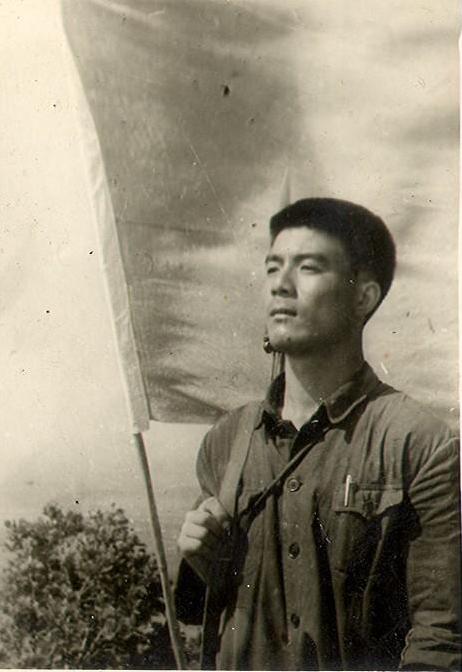
Wen Hai cultivated and guarded border areas in the northeast of China for nine years, devoting his youth to the great northern wilderness
When cultivating and guarding border areas in Hulin County, Heilongjiang Province, in 1977, Wen Hai received the news of the resumption of the national college entrance examination. This scholar, whose hands were full of calluses from nine years living in the Great Northern Wilderness, entered the room for the college entrance examination that had been suspended for ten years. More than 40 years later, Wen Hai believed that the resumption of the college entrance examination was a prelude to reform and opening-up. He especially praised the TV series “Deng Xiaoping at a historical turning point”. In particular, he saved fragments in this movie related to the college entrance examination and took a look at them from time to time. “It still feels like a dream. At that time, I was planting corn, cutting beans, and drinking 'Great Northern Wilderness Wine’ in the commune. I worked from sunrise and rested at sunset. I never thought I would enter Peking University one day.”
Since the convening of the Third Plenary Session of the 11th CPC National Congress and the discussion on “practice is the only criterion for testing truth”, the term “reform and opening-up” has gradually become familiar to the public. “Our Department of Economics is a place where discussions on the topic of reform and opening-up are particularly enthusiastic. Everyone is paying attention to various economic phenomena from the rural household contract responsibility system to the urban ‘self-employed’ business”, said Wen Hai.
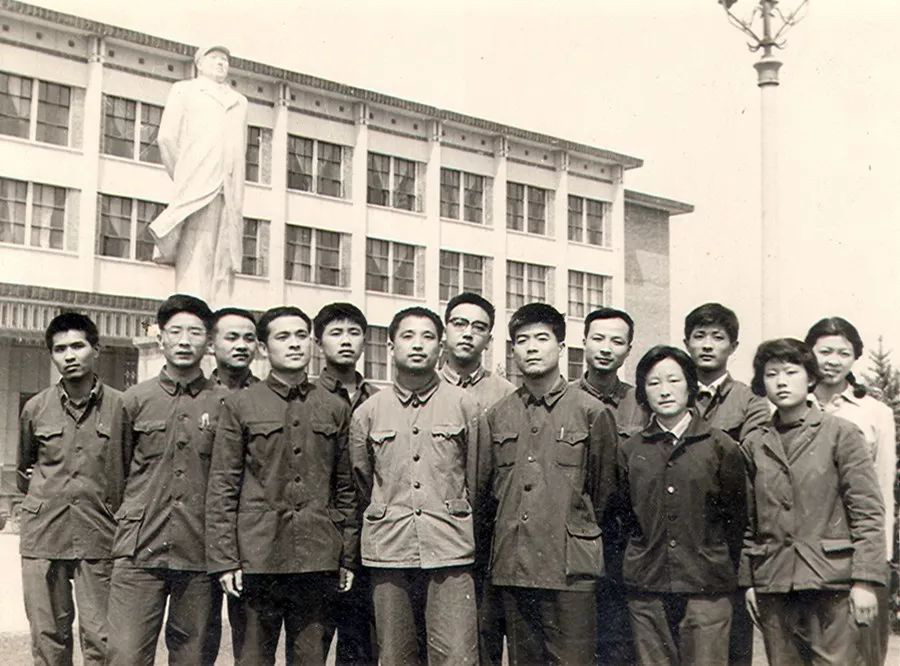 Group 6, Class 2, Department of Economics at Peking University. The third from the right in the front row is Wen Hai
Group 6, Class 2, Department of Economics at Peking University. The third from the right in the front row is Wen Hai
In the early days of reform and opening-up, there were all kinds of endless controversies. Wen Hai said: “The people’s commune had been in operation for more than ten years. Suddenly, the country wanted to contract out production to households and give the land to farmers for personal cultivation. Was this still socialism? Was it exploitation of the old society or capitalism to hire people in business?” The breakthrough of concepts shocked Wen Hai, and he realized that a change different from any previous political movement was rising in China.
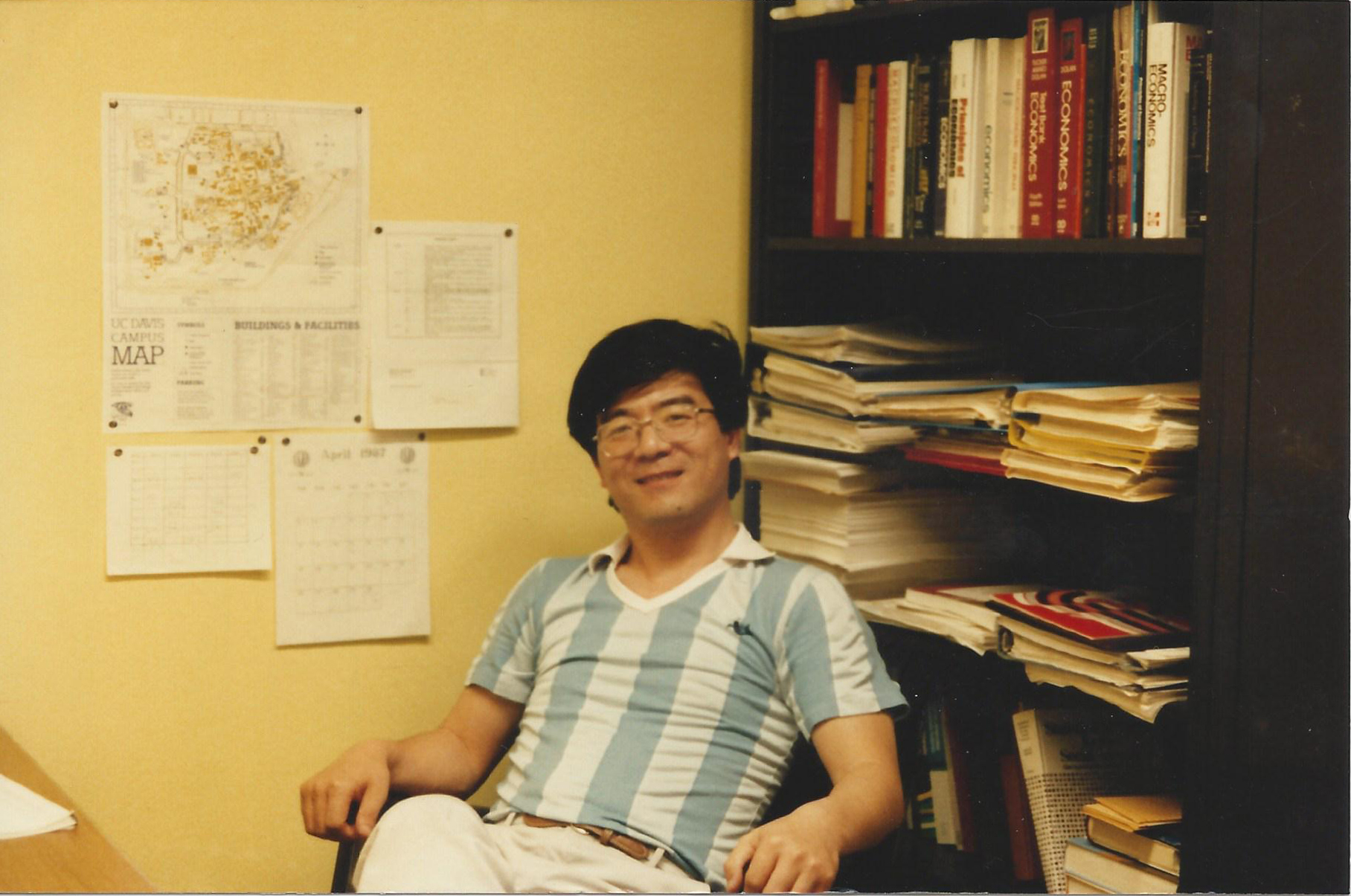 Wen Hai studied in the U.S.
Wen Hai studied in the U.S.
Wen Hai recalled that there were already many European and American students studying in the Department of Economics at Peking University, as well as teachers from Western countries, and everyone would discuss the road to China’s economic development. “At that time, I thought that just arguing was not enough. I had to go outside to look at the classics that others read, and to see how the economic system of western developed countries worked.” Graduating with a bachelor’s degree in early 1982, Wen Hai went to the United States at his own expense. After obtaining a master’s and then a doctorate, he stayed in academia and earned a tenured faculty position at the Business School of Ford Lewis College in the United States.
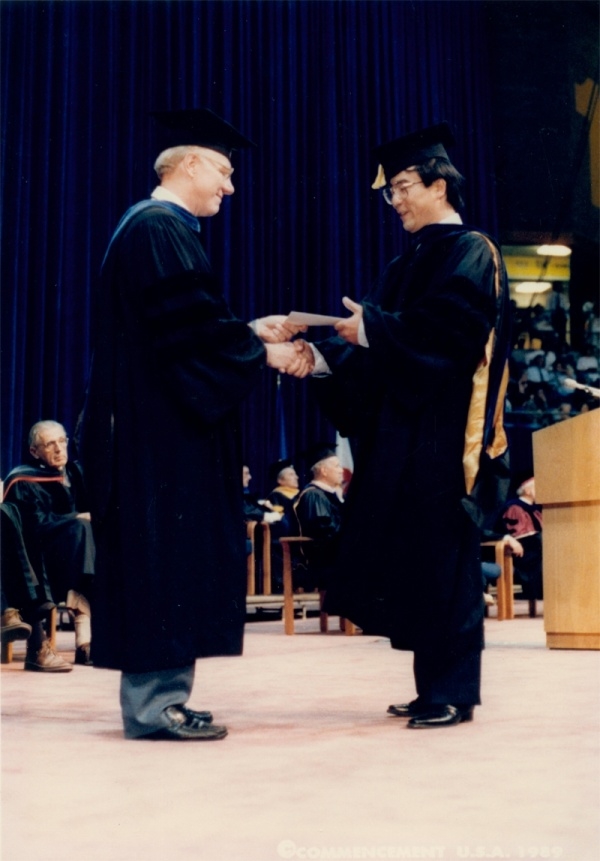
Wen Hai (right) graduated with a Ph.D.
During more than ten years in the United States, Wen Hai continuously remembered his original intention of “reciting classics” abroad. In 1994, a coincidental opportunity brought Wen Hai back to Peking University with Gang Yi (his “lower bunk” brother). They, together with Yifu Lin and other four returnee economists, founded the predecessor of the National School of Development of Peking University— the China Center for Economic Research (CCER).
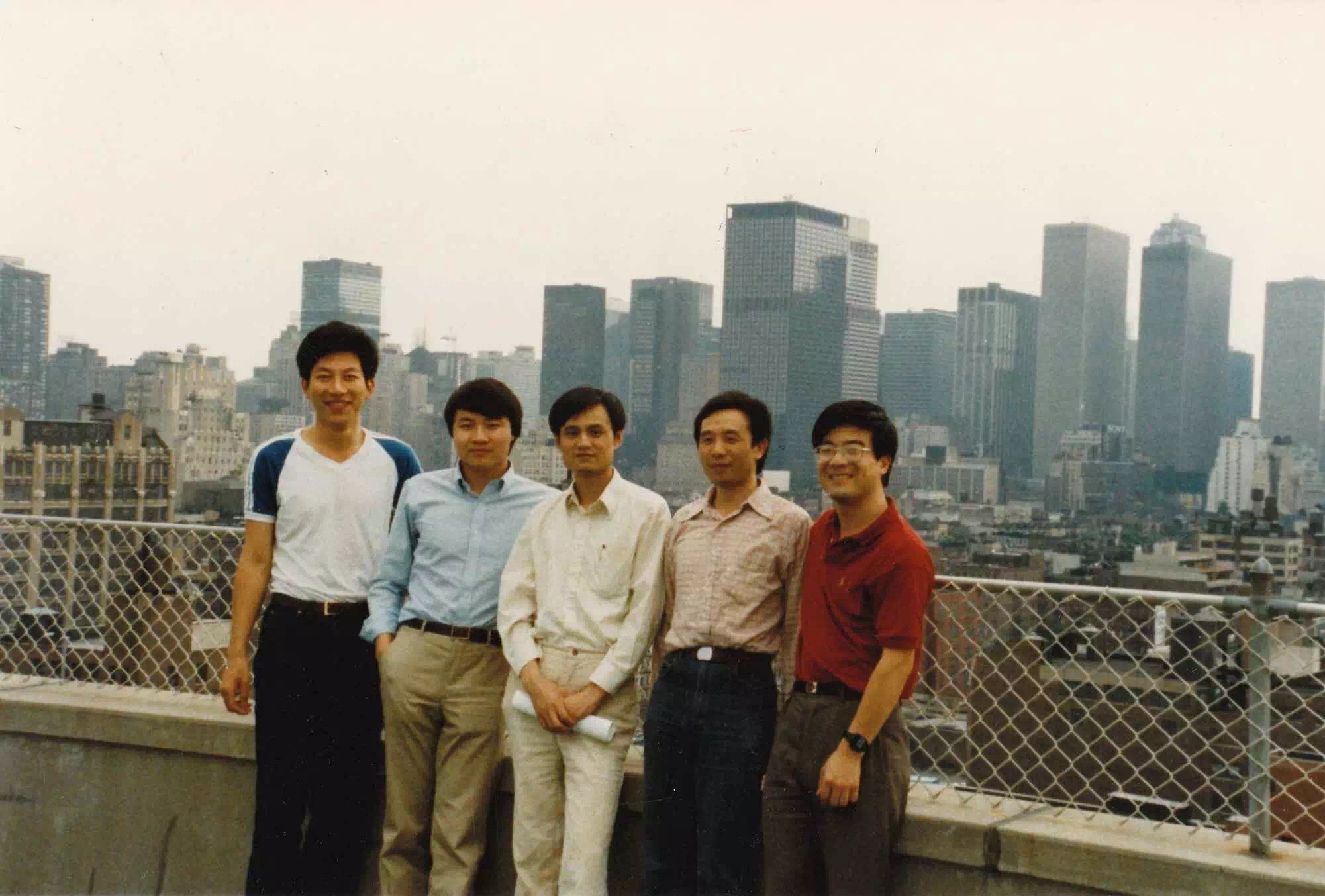 Wen Hai (first from right) and other founders of the Chinese Economic Association in the United States
Wen Hai (first from right) and other founders of the Chinese Economic Association in the United States
“At that time, the Party Central Committee made it clear to develop a socialist market economy. It was the exploratory stage of crossing the river by feeling the stones. Those of us as ‘returned scholars’ especially hoped to participate in such a great cause by combining what we had learned and seen with everything that was happening in China.” Wen Hai and his colleagues compiled several economic and management book series reflecting the market economy. He also edited the International Economics Translation Series to explore the nascent socialist market economy from the perspective of the integration of East and West.
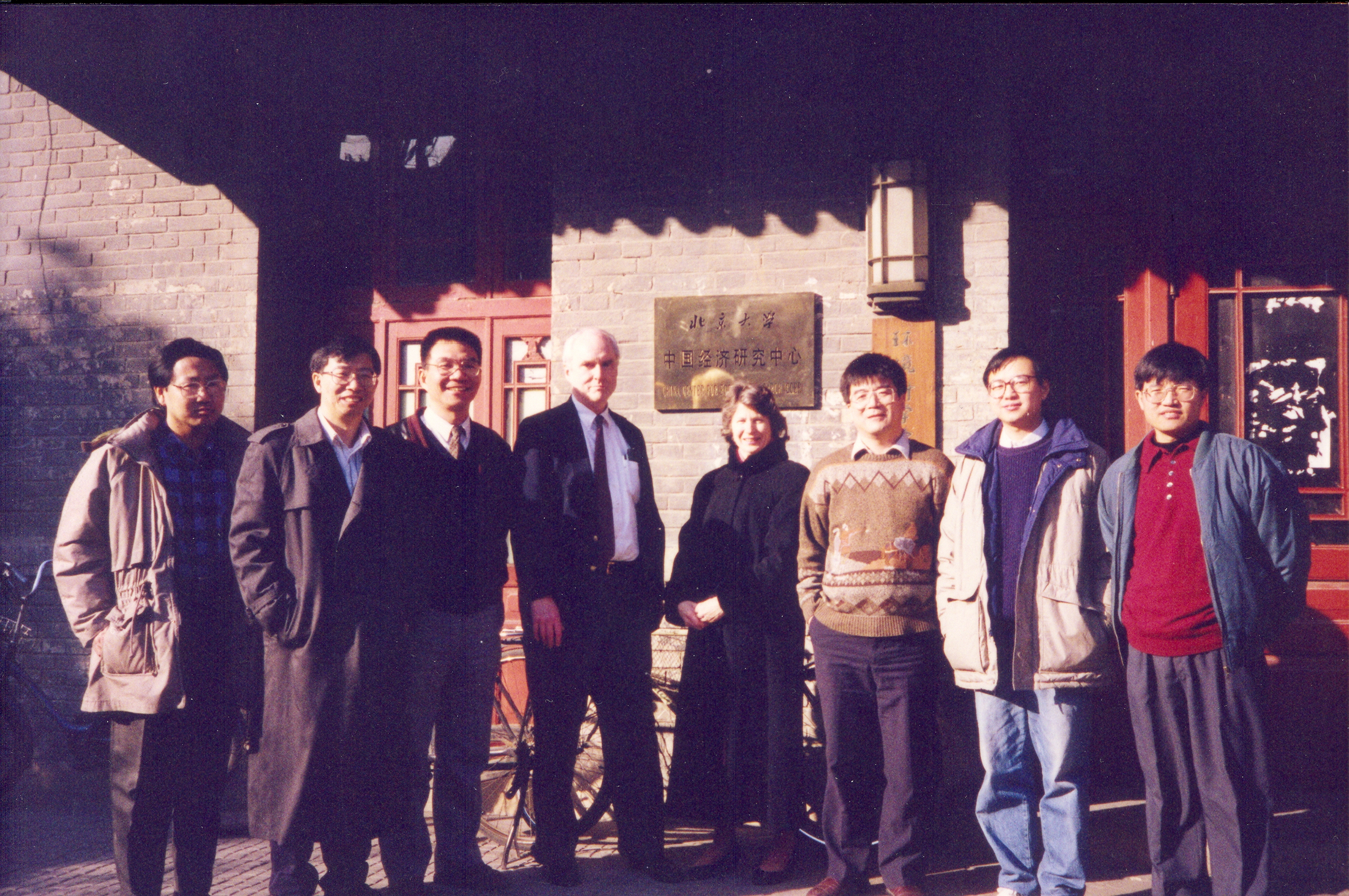 Wen Hai (third from right) returned to China and founded CCER with other scholars
Wen Hai (third from right) returned to China and founded CCER with other scholars
“In 1992, Comrade Xiaoping made a speech during his southern tour and wrote a poem on the South Sea where he once drew a circle. At that time, the central government’s confidence and courage in reform and opening-up increased. Shenzhen's continuous development and rise have become a microcosm of the success of reform and opening-up from the 1990s to the present.” In 2001, Peking University and the Shenzhen Municipal People’s Government signed the agreement on co-founding Peking University Shenzhen Campus and co-founded Peking University Shenzhen Graduate School. In 2005, Wen Hai, the vice president of Peking University at the time, was entrusted by the school to come to Shenzhen for “a second entrepreneurship”. He was responsible for the work of Peking University Shenzhen Graduate School and founded the Peking University HSBC Business School and the School of International Law.
In a speech at the 40th-anniversary celebration of the establishment of the Shenzhen Special Economic Zone, Present Jinping Xi pointed out that Shenzhen is a brand-new city created by the party and the people after the reform and opening-up. It is a brilliant interpretation of socialism with Chinese characteristics on a blank sheet of paper. The vast number of cadres and the masses in Shenzhen have overcome difficulties, worked hard, and accomplished in 40 years what it took some international metropolises abroad hundreds of years to accomplish. This is a miracle in the history of world development created by the Chinese people.
Recalling the situation when he first came to Shenzhen more than ten years ago, Wen Hai said with deep emotion: “At that time, Shenzhen could be considered as the ‘desert’ of higher education. Although the level of economic development was already very high, the ‘superstructure’ of education, scientific research, and culture had not kept up. Peking University should provide its own wisdom to the exploration of reform and opening-up and to the young city of Shenzhen.”
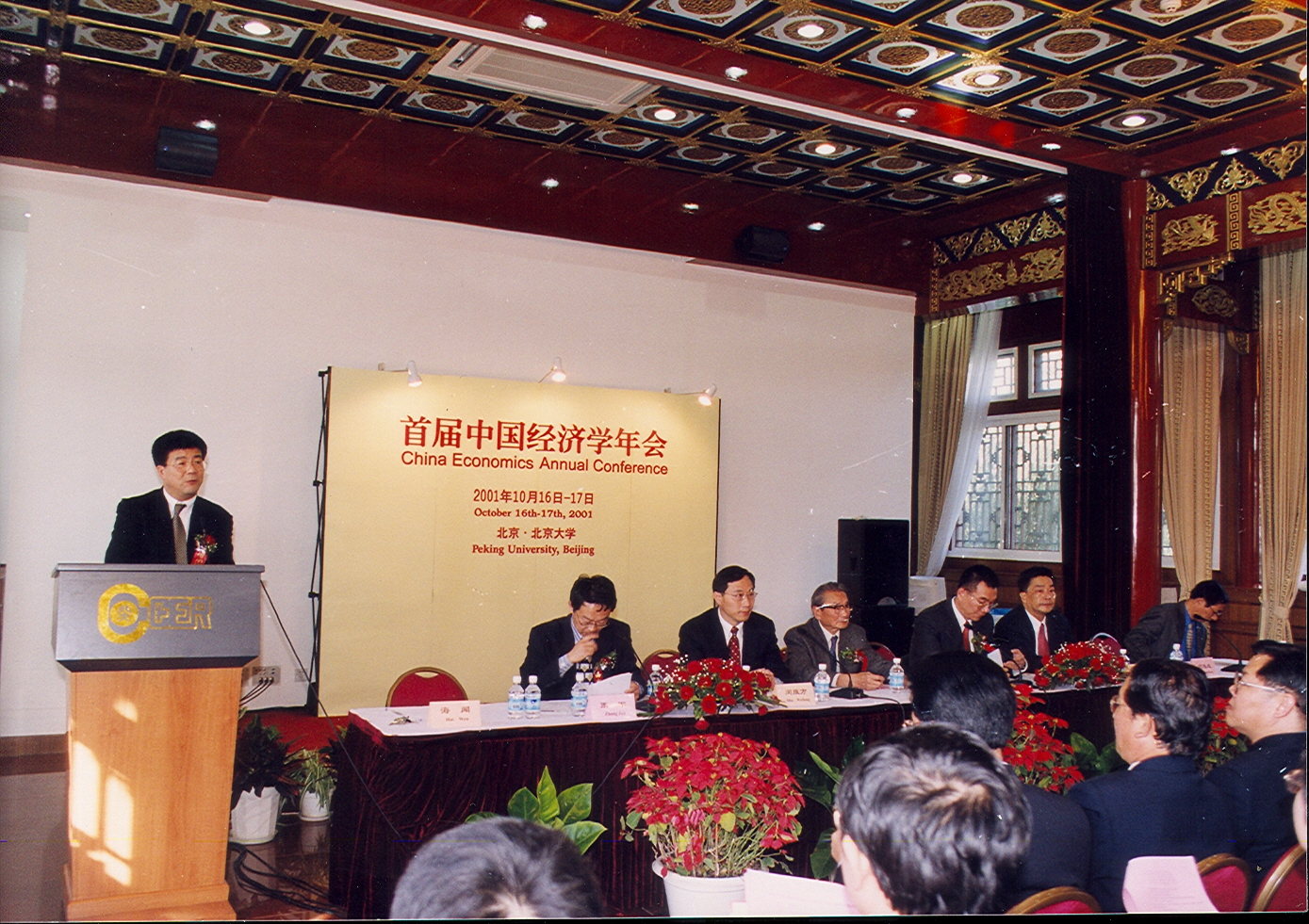 The China Economics Annual Conference was founded in 2001
The China Economics Annual Conference was founded in 2001
Since entrepreneurship, Wen Hai has led batch after batch of “Nanyan people” to work hard in the small town of Xili. Starting from the 5 colleges jointly established with the headquarters, it has developed into a well-known higher education institution with 8 frontier fields and interdisciplinary colleges, more than 3,000 full-time postgraduates, more than 700 faculty members, and multiple achievements in production, education, and research. In 2017, the Peking University HSBC Business School made greater open exploration and established the “UK Campus” in Oxford shire, England.
“I am the lucky one who has experienced the reform and opening-up. Everything about me is given by this great historical era. Because of this background, I have the opportunity to make progress for the country in education development. I never regret anything I have paid for this exploration.” Wen Hai said frankly.
2. View the History of Reform And Opening-up in Light of the Characteristics of the Times
As a participant of reform and opening-up, Wen Hai believes that the most important historical experience of reform and opening-up is to emancipate the thoughts and to give full play to the initiative and creativity of the people. “Without continuous emancipation of thoughts or continuous theoretical innovation, there will be no achievements and advancements in reform and opening-up and the construction of socialism with Chinese characteristics.” The history of reform and opening-up is an important part of the history of the party and the country, and Wen Hai hopes that when studying it, young students can look at problems in a developmental manner in the light of the background of the time.
He divided the 40-year history of reform and opening-up into four important development stages. The first stage was the 14th National Congress of the Communist Party of China from 1978 to 1992. During this period, the country focused on restoring the economy, breaking the rigidly planned economy in the past, encouraging the people to give full play to the enthusiasm and initiative of production and life, and “extracting” the national economy from “recession”. During the second stage, which was from the “Decision of the Central Committee of the Communist Party of China on Some Issues Concerning the Establishment of a Socialist Market Economic System” adopted by the Third Plenary Session of the 14th Central Committee in 1993 to the time when China joined the World Trade Organization (WTO), the country has formed a consensus on the development of a socialist market economy from top to bottom, determining to set the exploration of reform and opening-up as the form of a national policy. In this period, the economy and society continued to be energized, China entered the “take-off stage”, and industrialization and urbanization brought about the country’s industrial and social structure change. The third stage was from China’s accession to the WTO in 2001 to the 18th National Congress of the Communist Party of China. This stage was the period when China began to adapt to the rules and mechanisms of the international society and economic operation and continued to integrate into the world economy. The fourth stage was after the 18th National Congress of the Communist Party of China. China has made brilliant achievements in the construction of economy, politics, culture, society, ecological civilization, and law-based governance, gradually shifting from “integrating into the world” to “influencing the world”.
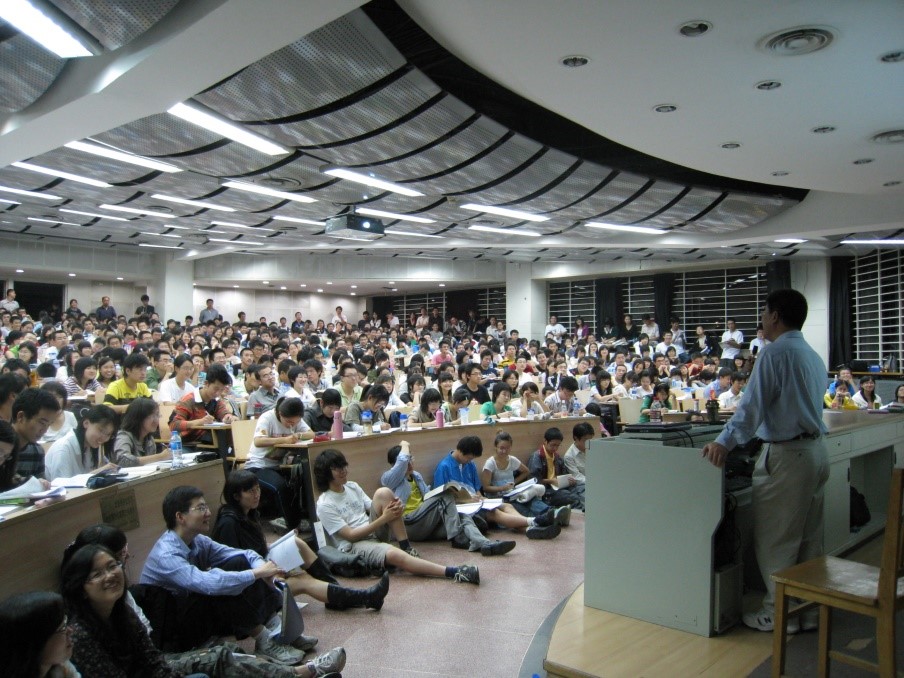 Wen Hai taught the course “Principles of Economics” to undergraduates
Wen Hai taught the course “Principles of Economics” to undergraduates
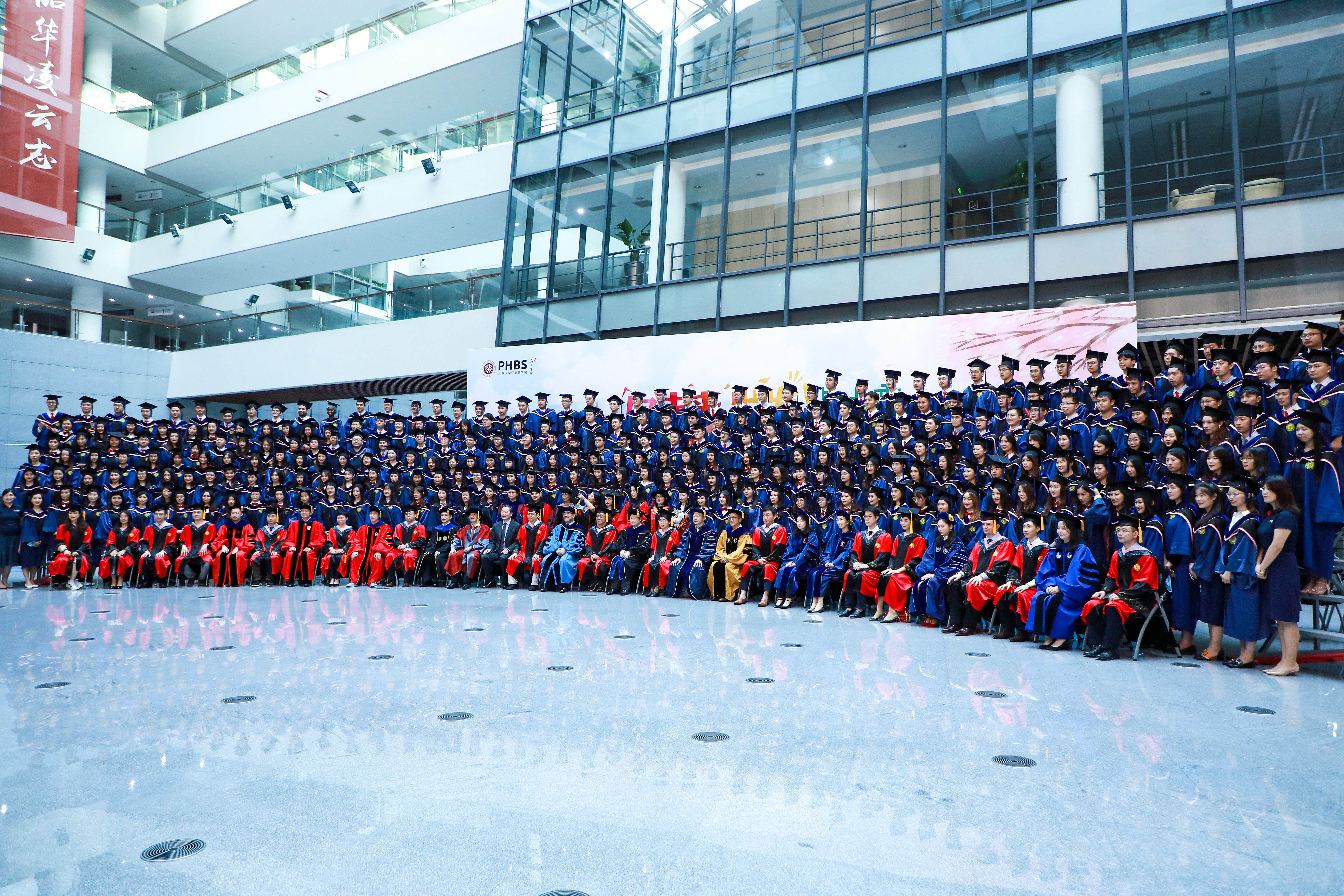 Graduation photo of PHBS students
Graduation photo of PHBS students
“The characteristics of each stage of historical development are different, and the historical missions that need to be undertaken are also different.” Wen Hai believes that the different historical periods before and after the reform and opening-up cannot be separated; the achievements of China after the reform and opening-up cannot be used to deny the hard work that new China has made for the exploration of the socialist road from its founding to the reform and opening-up.
“The difficulties we faced when new China has just been founded are beyond our imagination. The whole country was waiting to be rejuvenated, and the international environment was very dangerous. Therefore, the main task at that time was not to build a ‘Moderately Prosperous Society’. It was not enough to shout slogans of ‘emancipation of the mind’. You had to protect your home and the country, to feed the people, and to build industrial and agricultural infrastructure.”
Wen Hai compared China with India. As two large developing countries that won national liberation after World War II, China and India have chosen different development paths. “Although China has made many detours in the first three decades, it has laid a solid foundation in many fields. We have popularized elementary education, eliminated illiteracy, all backed by stable politics and infrastructure, so that we could concentrate on carrying out reform and opening-up and developing the economy later. China first solved the problem of people’s lack of food. However, there are still many people suffering from malnutrition because of hunger in India. This has resulted in several differences in the quality and speed of the subsequent economic development of the two major countries.”
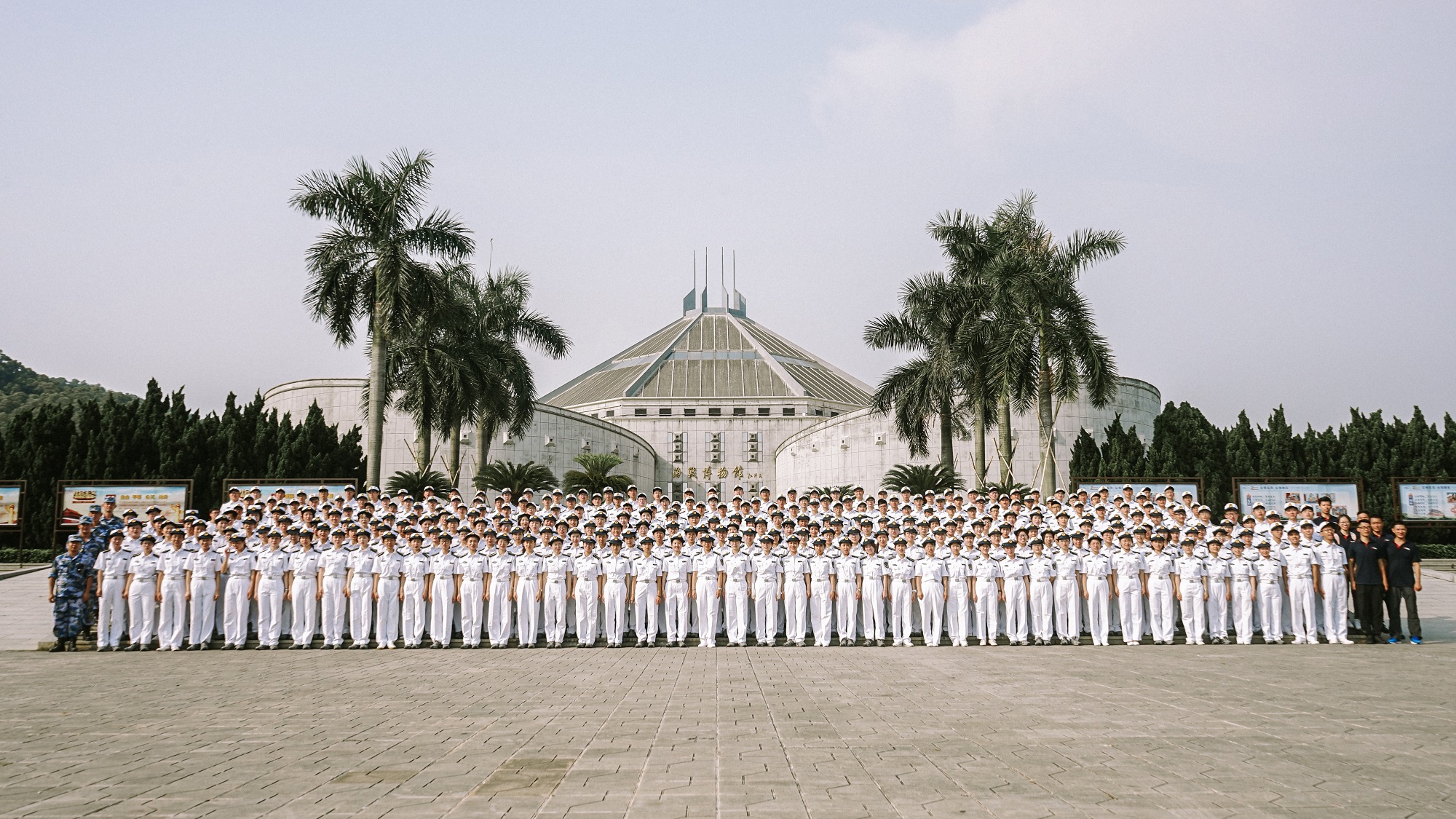 HSBC Business School Students’ Military Training
HSBC Business School Students’ Military Training
Wen Hai said: “The greatness and ingenuity of the Chinese Communists lie in advancing with the times and being able to continuously improve the strategies they adopt. For example, at the beginning of reform and opening-up, we needed to develop the economy as soon as possible to meet the people’s basic material needs. Therefore, we set GDP growth as the main goal. At that time, there was too much backwardness, so the need for development speed was necessary. However, as a series of environmental problems, unbalanced development problems, and rule of law problems appeared later, the Party Central Committee began to attach importance to the improvement of the quality, as well as the speed, of development, so that the national economy could attain a higher quality and more sustainable development.”
3. Peking University Members Must Always Stand at the Forefront of Reform and Opening-up
For more than 40 years of reform and opening-up, generations of Peking University members have led the times with ideas, served the country with academics, and benefited the people with hard work. They have integrated their lives and careers into the practice of fighting for the prosperity of the country and national rejuvenation. They have bravely led the trend of reform and made outstanding contributions to the development of the economy and society.
On August 31, 2020, Wen Hai, as PHBS Dean, gave a lecture entitled “Caring for Home and Country, Pursuing Excellence -- Peking University History and Peking University Spirit” to more than 500 freshmen of the class of 2020 at the opening ceremony. In nearly three hours, he imparted valuable historical knowledge of Peking University. He believed that every piece of history of Peking University, accompanied by the national crisis and the establishment of the nation, is a precious spiritual treasure that the new members of Peking University should not forget. “All students who are admitted to Peking University are intelligent and motivated. I hope they can ‘worry about the country and the people, shoulder social responsibility; pursue excellence, and reform and innovate continuously’.”
In Wen Hai’s eyes, Peking University members always have a sense of “worries”. They are not satisfied with the status quo and can always find problems. “The discovery of problems is due to a strong sense of social responsibility and mission. During the May Fourth New Culture Movement, members of Peking University awakened the ‘sleepers in the iron house’. During the reform and opening-up, Peking University members are always ‘problematically aware’. They are not satisfied with just proposing problems, but are more willing to practice personally and continuously reform and innovate in practice.”
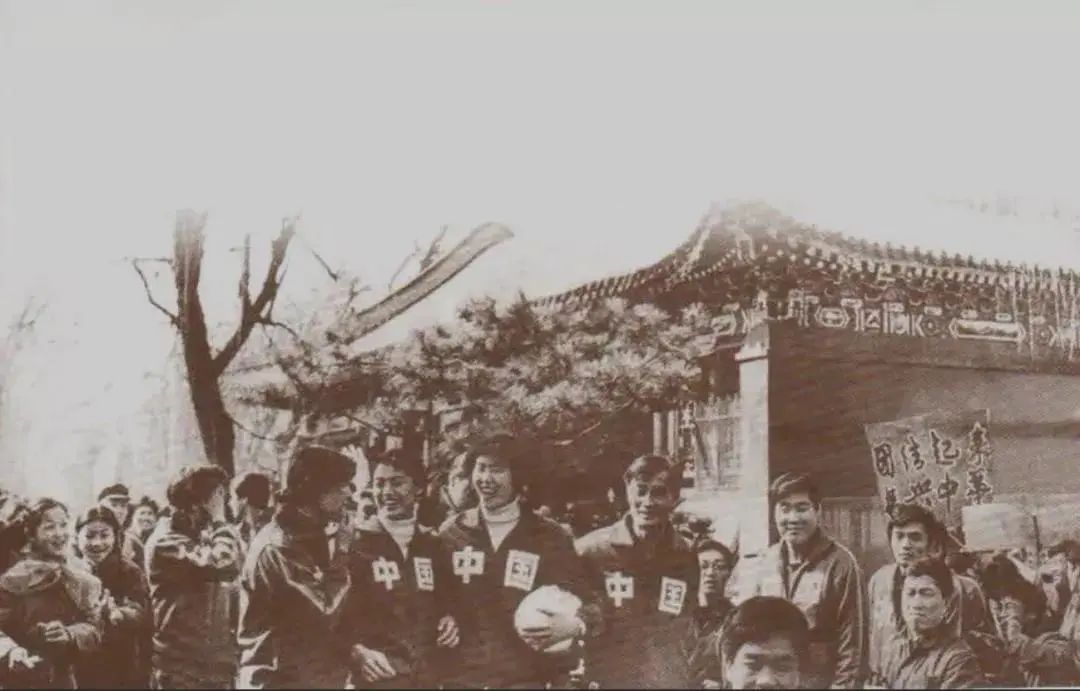 In 1981, Peking University students strongly voiced of the era of “Unite And Revitalize China”
In 1981, Peking University students strongly voiced of the era of “Unite And Revitalize China”
When recalling the most impressive scene at the beginning of reform and opening-up, Wen Hai talked about the moment when the slogan “Unite and Revitalize China” was shouted in Yanyuan— “No matter how many years have passed, I will not forget that night.” At that time, Wen Hai, who was in his senior year, sat around the only black and white television in the corridor with his classmates, and watched the final of the men’s Volleyball World Cup Asian qualifying match between China and South Korea. “At that time, the TV station needed to rent the satellite signal broadcasting rights, but the game was not finished after 2 hours and the broadcasting rights expired. Everyone was disappointed and had to listen to the radio. In the end, the Chinese team won. Everyone was very excited. It seems that the passion accumulated for a long time must be released! The students ran out of the dormitories and gathered in the open spaces between the buildings. More and more people gathered. People sang the national anthem and shouted slogans. I did not know who shouted the slogan of ‘Unite and revitalize China!’ Everyone’s emotions reached a fever pitch, and they all chanted this slogan together.”
These witnesses did not expect that the slogan that night and the emotions behind it would spread quickly like shock waves. It suddenly became the strong voice of the era that connected Chinese people around the world. “Because everyone had been suppressed for too long, there needed to be a force to unite the Chinese at home and abroad to work hard for our motherland, and to march forward bravely for the hard-won new era!”
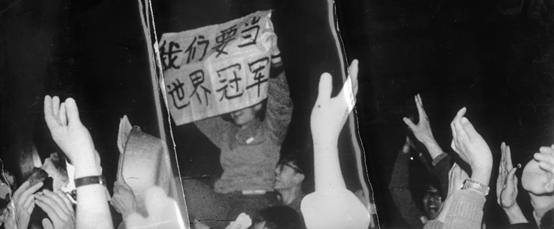
Class of 1977- We want to be world champions
In 2018, the 120th anniversary of Peking University, the 77th and 78th grades also held the 40th-anniversary commemorative activities. Wen Hai stopped for a long time before the school anniversary photo exhibition. These photos showed young students with a long-lost relaxed smile, the grand bonfire party held by Peking University students in 1981 to celebrate the Chinese women’s volleyball team’s first World Cup championship, and students diligently reading and discussing. Those photos took Wen Hai back to his youth when he worked hard with sweat and tears. “That was a booming age. I especially hope that the young people of Peking University still maintain the surging passion,” Wen Hai said touchingly.
Looking back at more than 40 years of reform and opening-up, Wen Hai believes that this is a miracle created by the Chinese people in the modern economic history of the world under the strong leadership of the Communist Party of China. “It allows the world to understand that the Western path is not the only way of economic development, and the path of socialism with Chinese characteristics, that respects the laws of market development and the will of the people, can also make brilliant achievements.” Therefore, young people should be full of confidence.
Self-confidence is not complacency: “Our country is stronger now, but the younger generation must not be complacent.” Wen Hai believes that it is important to study the history of reform and opening-up, extract experience, and sum up lessons, to contribute to the future economic and social development. He hopes that the members of Peking University would learn longitudinally with a developmental perspective, compare horizontally with an inclusive perspective, learn from each other’s strengths, and keep moving forward. “You are a generation that enjoys the dividends of reform and a generation that will contribute to the realization of the great revival of the ‘Chinese Dream’. You must not only insist on freedom of thoughts and dare to think and do, but also know how to respect rules and self-discipline. You should be brave and selfless to shoulder social responsibility, hold the pursuit of excellence consistently, and make achievements in all kinds of industries.” This is Wen Hai’s sincere sustenance to the young students at Peking University.
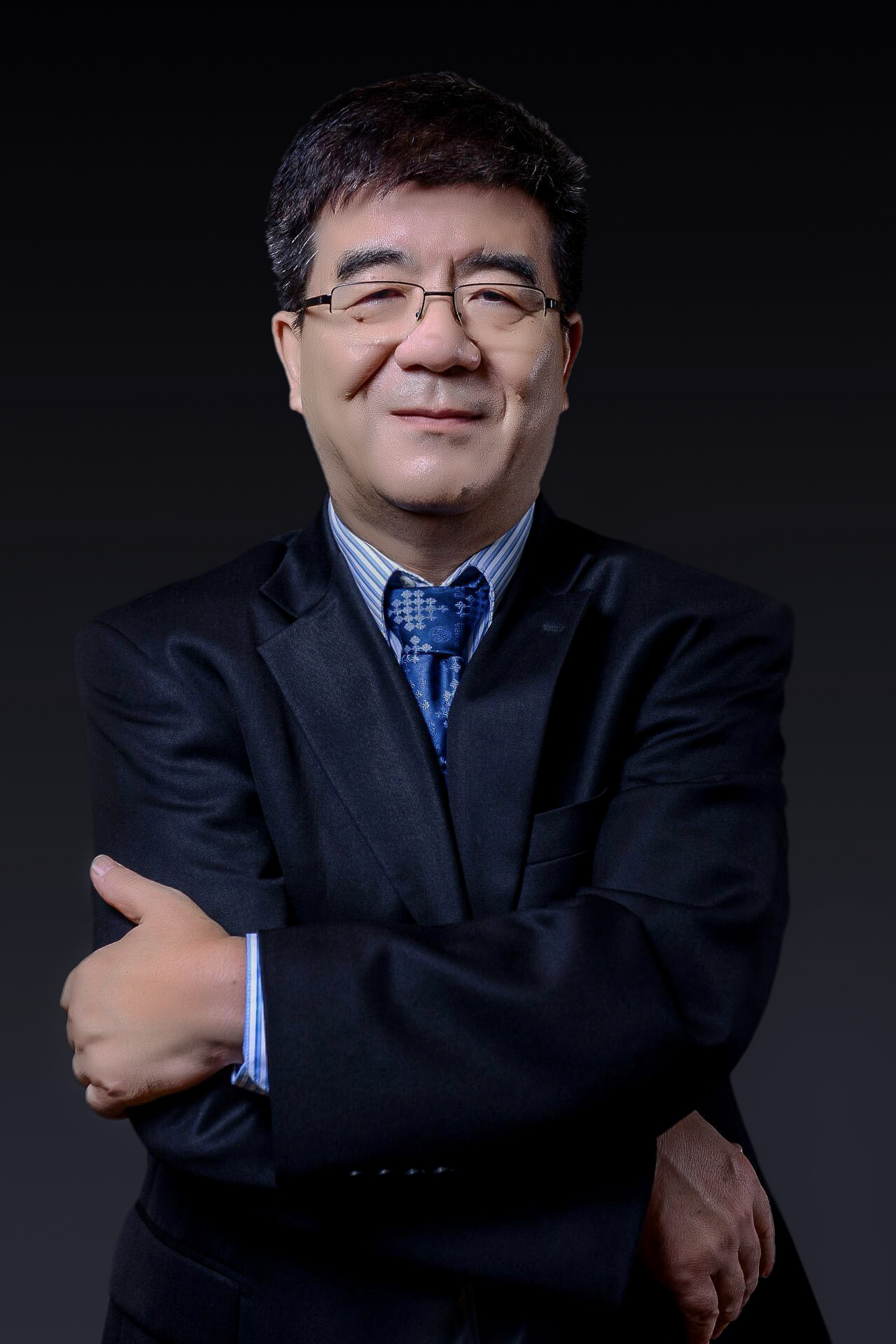
Wen Hai, Professor of Economics at Peking University, from Hangzhou, Zhejiang Province, graduated from the Department of Economics of Peking University in early 1982 (Class of 1977). He graduated from California State University, Long Beach, USA in 1983 with a master’s degree in economics. He graduated from the University of California (Davis) in 1991 with a master’s degree and a PhD degree in economics. He has taught in American universities for many years. He participated in the founding of the China Center for Economic Research of Peking University (now the National School of Development) and served as the executive deputy director. He used to be the Vice President of Peking University and Dean of Peking University Shenzhen Graduate School. He is currently the Vice Chairman of Peking University Council and Dean of Peking University HSBC Business School. His main teaching and research fields are international, development, and transition economics.
Translated by Jiahui Li, Bo Pang
Source from WeChat office account of Peking University
Editor’s note:
He was the first batch of rural educated youth who were admitted to Peking University after the resumption of the national college entrance examination. He said that he was very fortunate to have witnessed reform and opening-up. This reform, which attracted the attention of the world, has changed China and the destiny of thousands of young people.
His name is well-known at Peking University, where he is an economics professor whose classes are always full, and his life of struggle is a vivid case for studying the history of reform and opening-up.
He is Wen Hai, the Dean of Peking University HSBC Business School. He has devoted himself to the wave of reform and always takes the initiatives to engage in the innovation of education.
Outside the classroom, let us study the history of reform and opening-up with Professor Wen Hai. Let us strengthen the “Four Self-confidences” together, and discover his forty years of life with reform and opening-up.
44 years ago, as one of the first tranche of examinees after the resumption of the national college entrance examination, he walked out of the great northern wilderness and forged a lifelong bond with Peking University.
“The destiny of our generation has changed because of reform and opening-up. The history of this period is recent and is still being written, which requires young people to study it, not only knowing the facts but also having a rational understanding and thinking.” Wen Hai recalled his 40 years of life with the reform and opening-up and put forward suggestions for young students to study its history.
1. Fortune: Going Together with the Reform and Opening-up
In a speech at the conference celebrating the 40th anniversary of reform and opening-up, Present Jinping Xi pointed out profoundly that reform and opening-up is a great awakening of our party. And it was this great awakening, giving birth to our party’s great creation from theory into practice. Reform and opening-up is a great revolution in the history of the development of the Chinese people and the Chinese nation. It is this great revolution that promoted the great leap of the cause of socialism with Chinese characteristics!
“The greatest luck in my life is to experience the reform and opening-up.” Wen Hai said.

Wen Hai cultivated and guarded border areas in the northeast of China for nine years, devoting his youth to the great northern wilderness
When cultivating and guarding border areas in Hulin County, Heilongjiang Province, in 1977, Wen Hai received the news of the resumption of the national college entrance examination. This scholar, whose hands were full of calluses from nine years living in the Great Northern Wilderness, entered the room for the college entrance examination that had been suspended for ten years. More than 40 years later, Wen Hai believed that the resumption of the college entrance examination was a prelude to reform and opening-up. He especially praised the TV series “Deng Xiaoping at a historical turning point”. In particular, he saved fragments in this movie related to the college entrance examination and took a look at them from time to time. “It still feels like a dream. At that time, I was planting corn, cutting beans, and drinking 'Great Northern Wilderness Wine’ in the commune. I worked from sunrise and rested at sunset. I never thought I would enter Peking University one day.”
Since the convening of the Third Plenary Session of the 11th CPC National Congress and the discussion on “practice is the only criterion for testing truth”, the term “reform and opening-up” has gradually become familiar to the public. “Our Department of Economics is a place where discussions on the topic of reform and opening-up are particularly enthusiastic. Everyone is paying attention to various economic phenomena from the rural household contract responsibility system to the urban ‘self-employed’ business”, said Wen Hai.
 Group 6, Class 2, Department of Economics at Peking University. The third from the right in the front row is Wen Hai
Group 6, Class 2, Department of Economics at Peking University. The third from the right in the front row is Wen HaiIn the early days of reform and opening-up, there were all kinds of endless controversies. Wen Hai said: “The people’s commune had been in operation for more than ten years. Suddenly, the country wanted to contract out production to households and give the land to farmers for personal cultivation. Was this still socialism? Was it exploitation of the old society or capitalism to hire people in business?” The breakthrough of concepts shocked Wen Hai, and he realized that a change different from any previous political movement was rising in China.
 Wen Hai studied in the U.S.
Wen Hai studied in the U.S.Wen Hai recalled that there were already many European and American students studying in the Department of Economics at Peking University, as well as teachers from Western countries, and everyone would discuss the road to China’s economic development. “At that time, I thought that just arguing was not enough. I had to go outside to look at the classics that others read, and to see how the economic system of western developed countries worked.” Graduating with a bachelor’s degree in early 1982, Wen Hai went to the United States at his own expense. After obtaining a master’s and then a doctorate, he stayed in academia and earned a tenured faculty position at the Business School of Ford Lewis College in the United States.

Wen Hai (right) graduated with a Ph.D.
During more than ten years in the United States, Wen Hai continuously remembered his original intention of “reciting classics” abroad. In 1994, a coincidental opportunity brought Wen Hai back to Peking University with Gang Yi (his “lower bunk” brother). They, together with Yifu Lin and other four returnee economists, founded the predecessor of the National School of Development of Peking University— the China Center for Economic Research (CCER).
 Wen Hai (first from right) and other founders of the Chinese Economic Association in the United States
Wen Hai (first from right) and other founders of the Chinese Economic Association in the United States“At that time, the Party Central Committee made it clear to develop a socialist market economy. It was the exploratory stage of crossing the river by feeling the stones. Those of us as ‘returned scholars’ especially hoped to participate in such a great cause by combining what we had learned and seen with everything that was happening in China.” Wen Hai and his colleagues compiled several economic and management book series reflecting the market economy. He also edited the International Economics Translation Series to explore the nascent socialist market economy from the perspective of the integration of East and West.
 Wen Hai (third from right) returned to China and founded CCER with other scholars
Wen Hai (third from right) returned to China and founded CCER with other scholars“In 1992, Comrade Xiaoping made a speech during his southern tour and wrote a poem on the South Sea where he once drew a circle. At that time, the central government’s confidence and courage in reform and opening-up increased. Shenzhen's continuous development and rise have become a microcosm of the success of reform and opening-up from the 1990s to the present.” In 2001, Peking University and the Shenzhen Municipal People’s Government signed the agreement on co-founding Peking University Shenzhen Campus and co-founded Peking University Shenzhen Graduate School. In 2005, Wen Hai, the vice president of Peking University at the time, was entrusted by the school to come to Shenzhen for “a second entrepreneurship”. He was responsible for the work of Peking University Shenzhen Graduate School and founded the Peking University HSBC Business School and the School of International Law.
In a speech at the 40th-anniversary celebration of the establishment of the Shenzhen Special Economic Zone, Present Jinping Xi pointed out that Shenzhen is a brand-new city created by the party and the people after the reform and opening-up. It is a brilliant interpretation of socialism with Chinese characteristics on a blank sheet of paper. The vast number of cadres and the masses in Shenzhen have overcome difficulties, worked hard, and accomplished in 40 years what it took some international metropolises abroad hundreds of years to accomplish. This is a miracle in the history of world development created by the Chinese people.
Recalling the situation when he first came to Shenzhen more than ten years ago, Wen Hai said with deep emotion: “At that time, Shenzhen could be considered as the ‘desert’ of higher education. Although the level of economic development was already very high, the ‘superstructure’ of education, scientific research, and culture had not kept up. Peking University should provide its own wisdom to the exploration of reform and opening-up and to the young city of Shenzhen.”
 The China Economics Annual Conference was founded in 2001
The China Economics Annual Conference was founded in 2001Since entrepreneurship, Wen Hai has led batch after batch of “Nanyan people” to work hard in the small town of Xili. Starting from the 5 colleges jointly established with the headquarters, it has developed into a well-known higher education institution with 8 frontier fields and interdisciplinary colleges, more than 3,000 full-time postgraduates, more than 700 faculty members, and multiple achievements in production, education, and research. In 2017, the Peking University HSBC Business School made greater open exploration and established the “UK Campus” in Oxford shire, England.
“I am the lucky one who has experienced the reform and opening-up. Everything about me is given by this great historical era. Because of this background, I have the opportunity to make progress for the country in education development. I never regret anything I have paid for this exploration.” Wen Hai said frankly.
2. View the History of Reform And Opening-up in Light of the Characteristics of the Times
As a participant of reform and opening-up, Wen Hai believes that the most important historical experience of reform and opening-up is to emancipate the thoughts and to give full play to the initiative and creativity of the people. “Without continuous emancipation of thoughts or continuous theoretical innovation, there will be no achievements and advancements in reform and opening-up and the construction of socialism with Chinese characteristics.” The history of reform and opening-up is an important part of the history of the party and the country, and Wen Hai hopes that when studying it, young students can look at problems in a developmental manner in the light of the background of the time.
He divided the 40-year history of reform and opening-up into four important development stages. The first stage was the 14th National Congress of the Communist Party of China from 1978 to 1992. During this period, the country focused on restoring the economy, breaking the rigidly planned economy in the past, encouraging the people to give full play to the enthusiasm and initiative of production and life, and “extracting” the national economy from “recession”. During the second stage, which was from the “Decision of the Central Committee of the Communist Party of China on Some Issues Concerning the Establishment of a Socialist Market Economic System” adopted by the Third Plenary Session of the 14th Central Committee in 1993 to the time when China joined the World Trade Organization (WTO), the country has formed a consensus on the development of a socialist market economy from top to bottom, determining to set the exploration of reform and opening-up as the form of a national policy. In this period, the economy and society continued to be energized, China entered the “take-off stage”, and industrialization and urbanization brought about the country’s industrial and social structure change. The third stage was from China’s accession to the WTO in 2001 to the 18th National Congress of the Communist Party of China. This stage was the period when China began to adapt to the rules and mechanisms of the international society and economic operation and continued to integrate into the world economy. The fourth stage was after the 18th National Congress of the Communist Party of China. China has made brilliant achievements in the construction of economy, politics, culture, society, ecological civilization, and law-based governance, gradually shifting from “integrating into the world” to “influencing the world”.
 Wen Hai taught the course “Principles of Economics” to undergraduates
Wen Hai taught the course “Principles of Economics” to undergraduates Graduation photo of PHBS students
Graduation photo of PHBS students“The characteristics of each stage of historical development are different, and the historical missions that need to be undertaken are also different.” Wen Hai believes that the different historical periods before and after the reform and opening-up cannot be separated; the achievements of China after the reform and opening-up cannot be used to deny the hard work that new China has made for the exploration of the socialist road from its founding to the reform and opening-up.
“The difficulties we faced when new China has just been founded are beyond our imagination. The whole country was waiting to be rejuvenated, and the international environment was very dangerous. Therefore, the main task at that time was not to build a ‘Moderately Prosperous Society’. It was not enough to shout slogans of ‘emancipation of the mind’. You had to protect your home and the country, to feed the people, and to build industrial and agricultural infrastructure.”
Wen Hai compared China with India. As two large developing countries that won national liberation after World War II, China and India have chosen different development paths. “Although China has made many detours in the first three decades, it has laid a solid foundation in many fields. We have popularized elementary education, eliminated illiteracy, all backed by stable politics and infrastructure, so that we could concentrate on carrying out reform and opening-up and developing the economy later. China first solved the problem of people’s lack of food. However, there are still many people suffering from malnutrition because of hunger in India. This has resulted in several differences in the quality and speed of the subsequent economic development of the two major countries.”
 HSBC Business School Students’ Military Training
HSBC Business School Students’ Military TrainingWen Hai said: “The greatness and ingenuity of the Chinese Communists lie in advancing with the times and being able to continuously improve the strategies they adopt. For example, at the beginning of reform and opening-up, we needed to develop the economy as soon as possible to meet the people’s basic material needs. Therefore, we set GDP growth as the main goal. At that time, there was too much backwardness, so the need for development speed was necessary. However, as a series of environmental problems, unbalanced development problems, and rule of law problems appeared later, the Party Central Committee began to attach importance to the improvement of the quality, as well as the speed, of development, so that the national economy could attain a higher quality and more sustainable development.”
3. Peking University Members Must Always Stand at the Forefront of Reform and Opening-up
For more than 40 years of reform and opening-up, generations of Peking University members have led the times with ideas, served the country with academics, and benefited the people with hard work. They have integrated their lives and careers into the practice of fighting for the prosperity of the country and national rejuvenation. They have bravely led the trend of reform and made outstanding contributions to the development of the economy and society.
On August 31, 2020, Wen Hai, as PHBS Dean, gave a lecture entitled “Caring for Home and Country, Pursuing Excellence -- Peking University History and Peking University Spirit” to more than 500 freshmen of the class of 2020 at the opening ceremony. In nearly three hours, he imparted valuable historical knowledge of Peking University. He believed that every piece of history of Peking University, accompanied by the national crisis and the establishment of the nation, is a precious spiritual treasure that the new members of Peking University should not forget. “All students who are admitted to Peking University are intelligent and motivated. I hope they can ‘worry about the country and the people, shoulder social responsibility; pursue excellence, and reform and innovate continuously’.”
In Wen Hai’s eyes, Peking University members always have a sense of “worries”. They are not satisfied with the status quo and can always find problems. “The discovery of problems is due to a strong sense of social responsibility and mission. During the May Fourth New Culture Movement, members of Peking University awakened the ‘sleepers in the iron house’. During the reform and opening-up, Peking University members are always ‘problematically aware’. They are not satisfied with just proposing problems, but are more willing to practice personally and continuously reform and innovate in practice.”
 In 1981, Peking University students strongly voiced of the era of “Unite And Revitalize China”
In 1981, Peking University students strongly voiced of the era of “Unite And Revitalize China”When recalling the most impressive scene at the beginning of reform and opening-up, Wen Hai talked about the moment when the slogan “Unite and Revitalize China” was shouted in Yanyuan— “No matter how many years have passed, I will not forget that night.” At that time, Wen Hai, who was in his senior year, sat around the only black and white television in the corridor with his classmates, and watched the final of the men’s Volleyball World Cup Asian qualifying match between China and South Korea. “At that time, the TV station needed to rent the satellite signal broadcasting rights, but the game was not finished after 2 hours and the broadcasting rights expired. Everyone was disappointed and had to listen to the radio. In the end, the Chinese team won. Everyone was very excited. It seems that the passion accumulated for a long time must be released! The students ran out of the dormitories and gathered in the open spaces between the buildings. More and more people gathered. People sang the national anthem and shouted slogans. I did not know who shouted the slogan of ‘Unite and revitalize China!’ Everyone’s emotions reached a fever pitch, and they all chanted this slogan together.”
These witnesses did not expect that the slogan that night and the emotions behind it would spread quickly like shock waves. It suddenly became the strong voice of the era that connected Chinese people around the world. “Because everyone had been suppressed for too long, there needed to be a force to unite the Chinese at home and abroad to work hard for our motherland, and to march forward bravely for the hard-won new era!”

Class of 1977- We want to be world champions
In 2018, the 120th anniversary of Peking University, the 77th and 78th grades also held the 40th-anniversary commemorative activities. Wen Hai stopped for a long time before the school anniversary photo exhibition. These photos showed young students with a long-lost relaxed smile, the grand bonfire party held by Peking University students in 1981 to celebrate the Chinese women’s volleyball team’s first World Cup championship, and students diligently reading and discussing. Those photos took Wen Hai back to his youth when he worked hard with sweat and tears. “That was a booming age. I especially hope that the young people of Peking University still maintain the surging passion,” Wen Hai said touchingly.
Looking back at more than 40 years of reform and opening-up, Wen Hai believes that this is a miracle created by the Chinese people in the modern economic history of the world under the strong leadership of the Communist Party of China. “It allows the world to understand that the Western path is not the only way of economic development, and the path of socialism with Chinese characteristics, that respects the laws of market development and the will of the people, can also make brilliant achievements.” Therefore, young people should be full of confidence.
Self-confidence is not complacency: “Our country is stronger now, but the younger generation must not be complacent.” Wen Hai believes that it is important to study the history of reform and opening-up, extract experience, and sum up lessons, to contribute to the future economic and social development. He hopes that the members of Peking University would learn longitudinally with a developmental perspective, compare horizontally with an inclusive perspective, learn from each other’s strengths, and keep moving forward. “You are a generation that enjoys the dividends of reform and a generation that will contribute to the realization of the great revival of the ‘Chinese Dream’. You must not only insist on freedom of thoughts and dare to think and do, but also know how to respect rules and self-discipline. You should be brave and selfless to shoulder social responsibility, hold the pursuit of excellence consistently, and make achievements in all kinds of industries.” This is Wen Hai’s sincere sustenance to the young students at Peking University.

Wen Hai, Professor of Economics at Peking University, from Hangzhou, Zhejiang Province, graduated from the Department of Economics of Peking University in early 1982 (Class of 1977). He graduated from California State University, Long Beach, USA in 1983 with a master’s degree in economics. He graduated from the University of California (Davis) in 1991 with a master’s degree and a PhD degree in economics. He has taught in American universities for many years. He participated in the founding of the China Center for Economic Research of Peking University (now the National School of Development) and served as the executive deputy director. He used to be the Vice President of Peking University and Dean of Peking University Shenzhen Graduate School. He is currently the Vice Chairman of Peking University Council and Dean of Peking University HSBC Business School. His main teaching and research fields are international, development, and transition economics.
Get involved with your College and see what events and opportunities are available.
For a full listing of University events open to the public, visit the What's On website.
Share this

